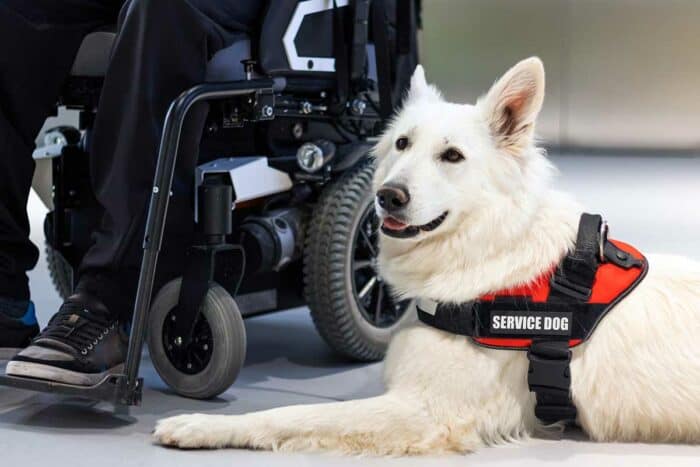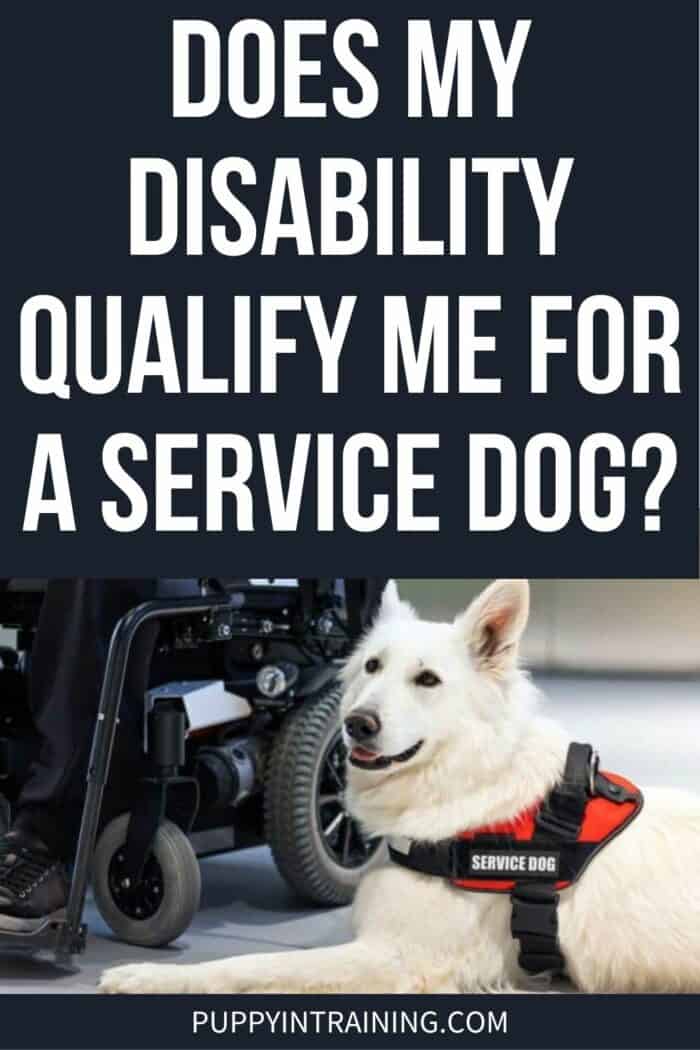Does My Disability Qualify Me For A Service Dog?
This post may contain affiliate links. We may earn money or products from the companies mentioned in this post.
Many different types of disabilities qualify for a service dog.
However, service dogs are not ideal for everyone because they require a lot of care and are not always the right treatment for everyone’s conditions.
There are several groups that different disabilities are classified into depending on the type of disability they are, their symptoms, and how they affect the disabled person’s body.
For example, there are physical or mobility disabilities, sensory disabilities, mental or psychiatric disabilities, and various other medical disabilities.
The American Disability Act (ADA) defines a disability as a physical and/or mental condition that prevents the sufferer from living a “normal” life in the same way as a non-disabled person.
Essentially, service dogs are used by disabled people to help them function more comfortably and efficiently in the world around them.
Read on to find out about the different kinds of disabilities that may benefit from the use of a service dog, the kinds of responsibilities surrounding service dogs and their care, and what legal stuff you need to know.

What Is A Service Dog?
A service dog is any breed of dog that has been trained to perform specific tasks to help their disabled handler live their life more easily in a world filled with barriers for disabled people.
They are trained by professionals or their handlers to maximize their handlers’ enjoyment, safety, and comfort and minimize possible accidents or episodes.
It is important to note there is a definite distinction between a pet, a service dog, and an emotional support animal.
Pets are owned purely for their owners’ enjoyment. Emotional support animals are owned to provide comfort to their owners (who in some cases also have disabilities or chronic illnesses) and ease their fears about being alone or in uncomfortable situations.
Service dogs are not owned for enjoyment or emotional comfort; they are owned by handlers to perform a specific job.
Handlers will often bond with their service dog over time and develop a deep emotional connection with them; however, that is not the primary task, nor goal, of a service dog.
Who Qualifies For A Service Dog?
The ADA has a very loose definition of disability so as to not alienate any disability due to constrictive wording.
Basically, the definition boils down to: if something about your physical or mental state interferes with your ‘normal’ functioning in life, then it can be counted as a disability.
To make it easier to understand, I’ve grouped the main types of disabilities together below and listed some of the most common ones where service dogs are utilized to enhance their owners’ quality of life or safety.
1. Physical Disabilities
Physical disabilities, also known as mobility disabilities, affect a person’s ability to move around in the world.
Service dogs can help provide physical assistance to handlers with physical disabilities so they can more easily and comfortably navigate their daily lives.
Some specific examples of physical disabilities that can benefit from the use of a service dog include:
- A wheelchair user may have a service dog that switches lights on and off, opens doors for them, presses elevator buttons for them, or reaches things they cannot.
- A person suffering from chronic dizziness, muscle weakness, or balance issues may use a service dog for physical support when they are walking around or using the stairs.
- A person who has had major surgery or a limb amputation may use a service dog to steady them in their rehabilitation period or while they are getting used to a new prosthetic.
Our fifth service dog in training, Adelle became a mobility service dog for her handler who was a veteran confined to a wheelchair.
2. Sensory Disabilities
Sensory disabilities are generally the most well-known of the many disabilities that may benefit from or require a service dog.
We have all watched movies and television where we have seen a blind person with a guide dog, but did you know hearing impaired people and partially blind people can benefit from the use of a service dog, too?
For example:
- Someone who has impaired sight, either partially or completely, may use a seeing eye dog also known as a guide dog to help them more easily navigate through the world around them. These dogs are literally trained to be their handlers’ “eyes” and are trusted almost implicitly to keep them safe from bodily harm.
- A person who is hearing impaired either partially or completely may use a service dog. These dogs are trained to alert their handler when there is noise around them or someone is trying to get their attention.
Our third guide dog puppy in training, Dublin was a guide dog. Dublin’s handler had limited vision but she was legally blind.
3. Mental Disabilities
Mental, psychiatric, or psychological disabilities can also benefit from using a service dog as part of their treatment plan.
These service dogs perform tasks that are specific to the mental health disability their handler suffers from.
For example:
- Someone who has autism spectrum disorder (ASD) may benefit from having a service dog act as a confidence-building companion and a physical boundary setter when the handler is out in public.
- People who suffer from post traumatic stress disorder (PTSD) may use service dogs to help them stay grounded in the present and avoid any emotional or cognitive triggers. Many veterans use service dogs in this way if they struggle with life after war.
- People who suffer from panic and anxiety attacks may use a service dog that is trained to alert them when they sense an attack coming on. The dog can alert their handler in order for them to sit down in a quiet place so the attack can pass safely and comfort them during the process.
- People with social phobias or agoraphobia may use service dogs to fetch and deliver parcels for them from their porch or help ground them when they are in public spaces that scare them, such as the mall or a school.
Our fourth guide dog puppy in training, Apache was career changed and now works with a veteran suffering from PTSD.
4. Medical Disabilities
Additionally, many medical (non-mobility related) disabilities can also require the aid of a service dog in order to improve the handler’s quality of life or prevent injury and accidents.
Medical service dogs are trained for the specific medical condition they assist their handler in dealing with.
For example:
- People with diabetes mellitus may use service dogs to detect when their blood sugar levels are low. The service dog can smell low or high blood sugar and will indicate to their owner that they need to sit down and test their sugar levels. This task ensures the person with diabetes does not enter glycemic shock.
- People who suffer from severe, life-threatening food allergies may use service dogs to detect certain allergens in their food. This is not a very common use of service dogs, as their sense of taste can be fallible; however, some people do rely on them.
- People who suffer from severe asthma may use service dogs to alert them when their breathing patterns change and to use their inhaler. The service dog may even be trained to find another human and bring them for help.
- People with epilepsy commonly use service dogs to sense when a seizure is about to happen. The service dog will alert the owner accordingly, and the owner will then lay down in a safe, clear space. The service dog will usually lay near the owner or directly on their chest to protect them and perform deep pressure massages. Alternatively, the service dog may be trained to go look for help.
Our sixth service dog puppy in training, Archer works with a little girl who suffered from a traumatic brain injury.
Who Should Get A Service Dog?

Service dogs are suggested to patients by licensed medical professionals if they determine having a service animal would benefit the patient.
However, depending on the patient’s conditions and lifestyle, they may also advise against the use of a service animal, too.
This is because service dogs are a lot of responsibility and work for a handler.
If the handler cannot take proper care of the service dog, then having the service dog is actually doing a “disservice” to their disability.
To properly care for a service dog, a handler has to:
- Be able to financially afford food for the dog
- Reliably perform daily care tasks like feeding, cleaning up after the dog, and grooming
- Be able to afford yearly vet visits and vaccinations
The Legal Stuff Surrounding Service Dogs
Many people have concerns about the legal regulations and guidelines surrounding service animals, such as where they can go, whether or not the dog’s particular breed matters, and what information they must disclose to businesses and other people they encounter in their day-to-day lives while with their service dog.
Below, I’ll address some of the most common questions and concerns relating to this topic. Hopefully, this clears up some of those questions you may have.
What Can People Ask Me About My Service Dog?
Legally, people cannot ask you what your specific disability is or why you need a service animal.
Businesses and the general public are limited to asking only two very specific questions you are obligated to answer under the ADA.
- Is the dog required because of a disability? (Yes/No)
- What task has the dog been trained to do? (Sense seizures/Open doors for me/Detect blood sugar levels/etc.)
Can I Be Barred From A Place Of Business Or Residence Because Of My Service Dog?
Service dogs may not be barred from a place of business, even if that business prohibits other pets.
However, this is only true if the presence of the service dog does not fundamentally alter or interfere with the business.
For example, a service dog may be barred from parts of a zoo or animal sanctuary where there are prey animals.
Can I Be Barred From A Place Of Business Or Residence Because Of My Service Dog’s Breed?
You and your service dog cannot be discriminated against based on their breed.
If your state or municipality has local laws banning specific breeds from being owned, this law cannot be enforced on your service dog.
Do I Have To Certify My Service Dog With A Specific Organization?
If your state has laws that require all dogs to be registered and vaccinated with them, then your service dog needs to be registered and vaccinated, too.
However, you do not, under any circumstances, have to register your dog specifically as a service dog according to the ADA.
FAQs About What Disabilities Qualify For Service Dogs…
Do service dogs have to wear a vest?
Service dogs do not have to wear a vest, collar, or jacket signifying they are service animals.
Some people do not wish for others to know they need a service dog to navigate life, and others may feel like it is an imposition into their privacy.
Whatever your stance on the vest is, it is not required by law.
However, it is always a good idea to have a collar on your service dog with your medic alert on it in case of an emergency where medical professionals need to be given vital information to save your life.
Does my service dog need to have formal training?
Service dogs do not need formal or specialized training if you are able to do it yourself.
Many companies prey on people’s wariness about training service dogs; in reality, it a dedicated individual can do the training themself.
Keep in mind you need to do a lot of research and have plenty of patience with your pup, though!
Here is a look at what commands I recommend you teach your service dog.
Can I have more than one service dog?
You can have more than one service dog if there are specific tasks each one performs for you, especially if you have more than one disability.
For example, someone who is epileptic and suffers from tree nut allergies may have one service dog that smells their food, while the other indicates when the handler is about to have a seizure.
For a closer look at why you can have more than one service dog, take a look at my dedicated article.
Final Thoughts
If something about your physical or mental state interferes with your ‘normal’ functioning in life, then it can be counted as a disability which qualifies you to have a service dog.
Service dogs are not pets nor emotional support animals; they are working dogs with specific jobs to do to help their handlers have a better quality of life in a world that has many barriers for people with disabilities.
Let’s quickly recap the different groups of disabilities that may require a service dog:
- Physical disabilities
- Sensory disabilities
- Mental disabilities
- Medical disabilities
This article does not list every single specific disability, as that would be nearly impossible. If you have any questions please leave us a comment below.
Do you have a service dog? Tell us about your experiences.
Save To Pinterest

Top Picks For Our Puppies
- BEST DOG CHEW
We Like: Beef Collagen Sticks - All of our pups love to bite, nip, and chew. We love using Collagen Sticks to help divert these unwanted behaviors. - BEST PUPPY TOY
We Like: Calmeroos Puppy Toy w/ Heartbeat and Heat Packs - Perfect for new puppies. Helps ease anxiety in their new home. - BEST DOG TREATS
We Like: Crazy Dog Train-Me Treats - We use these as our high-value treats for our guide dog puppies. - BEST FRESH DOG FOOD
We Like: The Farmer's Dog - A couple months ago we started feeding Raven fresh dog food and she loves it! Get 50% off your first order of The Farmer's Dog.
Check out more of our favorites on our New Puppy Checklist.